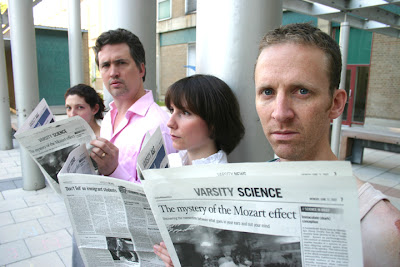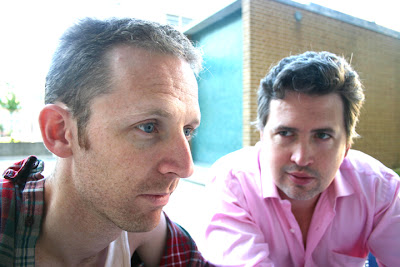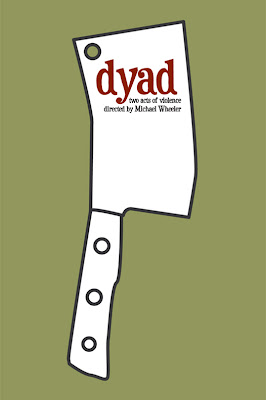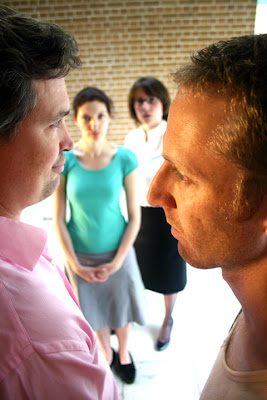1) What the fuck is going on?
My allergies are starting to get really get bad now, the heat has moved up the chart from “stifling” to “oppressive”, I fell of a bike and ripped up my shoulder and banged up my right hand, and I’m playing a character in a production of Mojo – which just opened – that spends the whole time complaining, whining and blaming. Apparently it’s worn off on me . . .
2) What do you like about the Fringe show you’re acting in, Dyad?
Quite a few things:
- I love the status switch. Simon Ogden’s done a wicked job of flipping the status ever so slowly and organically. It’s a gigantic change globally, but an extremely subtle change locally.
- I love that we’re going to be doing it outside. It’ll make it that much more realistic, almost like the audience is witnesses something they shouldn’t be seeing, or should at least be doing something to stop it.
- I love that the concept of the piece is so simple: two guys outside a building with some smokes. It takes a very basic moment in two human’s lives and explores that to the fullest. No bells and whistles.
- I love that I can play with the audience’s natural ability to create first impressions. They’ll assume a lot about my character because of what I wear and how I behave initially, but then I can unwind all that and show them a much fuller human with layers of issues and wants.
3) As an actor, how concerned are you with emphasizing or playing to Dyad’s opposition themes?
Not at all really. I think Simon has written the piece well enough that the themes expose themselves. I’m guessing that [director] Michael Wheeler ensures that they’re being exposed to the audience properly. As an actor, my concerns lie with making this character a human being that lives his life out to the fullest in the given situation.
4) How much does your approach to acting change to accommodate the challenges of site-specific performance?
It depends on the director and the piece. For Dyad we’ll have to make sure that our volume is up because we’re outside. There’s less control over the environment, so we’ll have to be sure to react to whatever happens around us. For example, if a siren passes us, that’s going to influence what we’re doing drastically. Also, because it’s site-specific and potentially feels more “real” to the audience, we’ll have to be ready for them to get involved either spatially or vocally.
I did a show at UW that split the audience into three and put them in different parts of a house. At one point two of the characters left the room to go outside and get into a fight. A different audience group was immediately above them on a balcony and could hear the fight. They all rushed to the railing to watch, completely ignoring the characters in front of them. Then a passer-by started yelling, “Talk it out!” to the fighters. It was the most beautiful chaos that we could’ve hoped for. That kind of surprise is gold, but you have to be ready to go with it.
5) Do you have any unifying theories that have come out of your study of the Meisner Technique?
I’ve read a slew of books of actor’s talking about the craft and the only word or concept that appears without fail is “truth”. There are so many approaches to try to achieve truth; Meisner’s just one of them. Unifying theories or comprehensive “systems” are dangerous. No technique can achieve truth if it’s followed to the letter. They’ll give you a jump start or point you in a direction that is potentially good, but it’s such a complex, yet basic thing to achieve truth, that if you try to force a system on it, it’ll disappear.
6) To what degree do you think substance abuse is a problem in Toronto’s theatre community?
From my perspective it’s no more of a problem then in any other job. But I’ve got less adventurous tastes than some.
7) Any thoughts on leadership and how it relates to theatre?
We need more leaders in indie theatre and film. We need people to take the initiative to make things happen here for ourselves. We need strong producers. There are so many talented people in Toronto that aren’t working – why not? Just create. Talk to people, meet new people, collaborate, combine resources. Make it happen.
8) How much of your artistic process is informed by a sense of anger?
Less anger and more frustration. Theatre and film can be such powerful mediums. When I see product out there that isn’t really trying then it feels like such a waste. It gives the industry a bad name and gives people permission to expect less when they go out to see a show. We should be constantly pushing to challenge ourselves and our audiences.
 9) What kinds of questions do you like to be asked about your work?
9) What kinds of questions do you like to be asked about your work?
I like questions that I start answering with “I don’t know”. It normally means that it doesn’t have an obvious answer to me and I’ll have to spend the next little while thinking about it, talking it out, and then discovering how I feel. I love to talk theory and detailed practicality of technique. I absolutely love talking about what makes characters tick.
10) Where’s the glory?
It lies in realizing what it feels like to go through something that you would never necessarily go through in your own life. Experiencing what it feels like to think like a different human being. Learning to see a different perspective on the human condition. Which is why, when it comes down to it, I don’t care that I’ve been a little whiny lately . . .



stop whining tompa. oh, great show last night. awesome theatre created out of raw space. young crowd, edgy show, strong perfromances. Im talking about MOJO of course.
Thanks Dave. Cheque’s in the mail.
as david’s meisner teacher i’m not sure he’s telling the complete “truth” about his work in the technique.